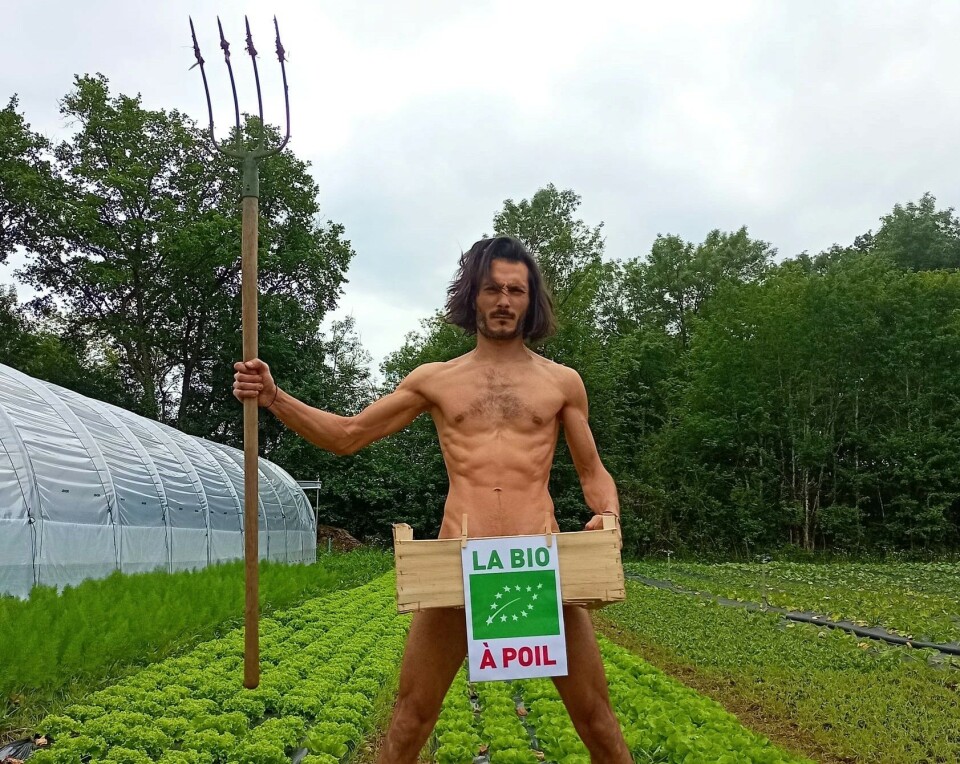-
Mysterious boom rattles residents in south-west France
Local community turns to social media for answers
-
France tightens reimbursement rules for flight delays or cancellations
New measures include mandatory mediation and new claim procedures
-
What snow conditions look like for skiers across French Alps and Pyrenees
Ski resorts are expected to get busier as school holidays begin this weekend
Organic farmers in France stage naked protest against aid cuts
Workers post nude photos online to gain attention after proposed change to the EU common agricultural policy

Organic farmers in France are taking part in protests today – including posting pictures of themselves naked online – against government proposals which they claim will cut funding by half.
At the core of the dispute are government plans to replace specific aid for organic farms (called agriculture bio in French).
They currently get limited aid under a scheme called the Prime Service Environnement (PSE).
But government plans linked to the new EU common agricultural policy now being discussed, will replace PSE with a new system which covers nearly every farm in France.
Under the new system, called the Haute Valeur Environnementale (HVE), aid is now partially linked to assurances by farmers that they will limit fertiliser and pesticide use and stop practices like destroying hedgerows. It was recently introduced by the Agriculture Ministry in conjunction with the Environment ministry.
Critics say it amounts to little more than greenwashing, and its standards are far behind those of certified organic farms.
“It is a stab in the back for organic farmers and consumers in France,” said Mathieu Rullier, the president of Vienne Agrobio who is organising protests in Vienne and in La Rochelle.
“We get very little help compared to the non-bio farms and under these proposals the average farmer will lose aid of €132 (per hectare, each year) – over half of the help they get.”
He said the idea of the protest spread like a wild fire – including the posting of naked pictures as people recognised it was the best way to get attention.
“People are very angry – the government is always talking of how they support the move to bio and want to cut the use of pesticides in France but when they have a chance to put things into action they do the opposite. Under this scheme there will be no difference between a bio farm and an HVE one which still pours synthetic pesticides on the fields.”
A large protest is planned for Paris, at Les Invalides, whilst others will take place in each regional capital and departmental prefectures.
All sectors of organic farming including livestock, wine, arable field crops and market gardeners are represented.
The new scheme was announced as part of the plans for the new Common Agriculture Policy of the European Union, due to run from 2023 to 2027.
While the amount of money allocated to France under the scheme has not changed – €9.5 billion, the individual governments have to say how they will distribute the subsidies.
“It was only when reading the details of the plan that we saw the cut to PSE, and realised the implications,” said Mr Rullier.
“We were not consulted about it.”
Attempts to get a response from the Agriculture ministry by telephone and email were unsuccessful.
The ministry of Agriculture estimated in April this year that 12.6% of cultivated land in France was under certified organic farming systems.
The government also acknoweldged that its target for 2022, whereby at least 15% of cultivated land in France would be under organic farming systems, would not be met. This shortfall is in spite of a budget of €1.1 billion having been spent on conversion schemes.
























